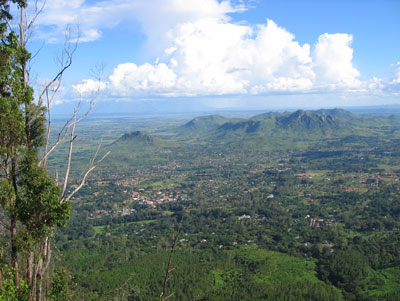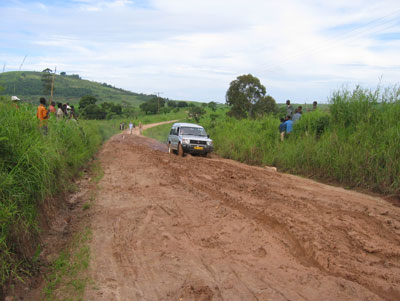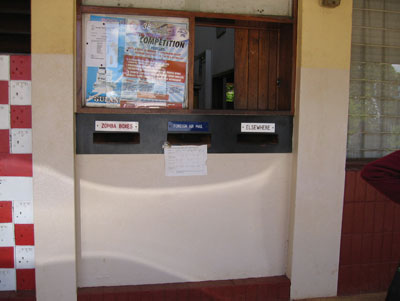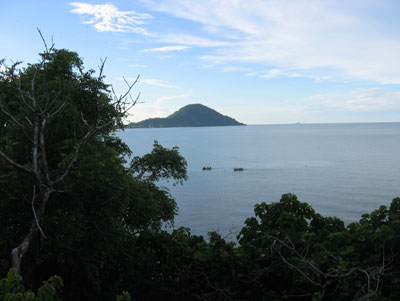Lepidopterists on the loose in unspoiled Malawi
by Ailsa Donnelly, Binghamton, NY
Interested by the chance to see an almost totally unspoiled African country, my husband, Nick, and I planned a visit to Malawi for February ’09.
Making arrangements
Reserving our flight was interesting. I tried to use our mass of frequent-flyer miles about 10 months before we were due to leave but kept finding “no seats available for that date.” I checked routes through every possible airport in Europe and kept coming up with fares of $3,000-$4,000, so I finally went to our local AAA travel agency.
The very helpful agent there said that if we drove down to Washington and flew from Dulles to Addis Ababa on Ethiopian Airlines and from Addis Ababa to Lilongwe in Malawi, we could fly for around $1,300 each. I am now convinced that for difficult trips like this, I will always get outside help!
The purpose of our trip was to collect dragonflies; we also had a side interest in birds. We are not at all scientific about this birding business; we have no lists, but we do carry a bird book and binoculars wherever we go.
Malawi does not have the animals in its parks that are found in the neighboring East African countries. There are some hippos and crocodiles, a rumor of lions, a leopard or two, masses of baboons and vervet monkeys, herds of various sorts of antelope, some newly imported rhinos and a herd or two of elephants, one of which is reputed to be “tricky.” (Watch out for “tricky”; it’s a euphemism for “really wicked.”)
The bad bits
What the country lacks are two vital things: a reliable and widespread supply of electricity and good roads. The country is prone to “rolling brownouts” in places where there is electricity, but in many places there is none at all.
The roads, with names culled from the UK (M-1, M-10 and so on), sound great, but they are 2-lane affairs (one in each direction) and the potholes are mammoth. Off the M roads you’ll encounter dirt roads, which in the rainy season are beyond belief. We were there in the rainy season.
The main roads are not so much patrolled by the police as they are blocked by the police. There were frequent roadblocks — to search for what, we never determined, although at the first one we encountered we found that we had rented an unlicensed car (translation, fine) and at another we discovered that our car did not have the requisite red reflecting tape on the rear bumper (another fine).
What Malawi does have are large flocks of foreign non-governmental organizations (NGOs), mostly from the US, all there to help the country with its AIDS and malaria problems. We were told that the life expectancy in Malawi is 44, but the population of this overpopulated country continues to rise.
We also discovered that the hospitals are extremely poorly equipped, and out in the countryside we came across modern ambulances with absolutely zero equipment in the rear — no place to put a stretcher, nothing at all. That they are now being used as taxis came as no surprise.
Everywhere we went there were people walking beside the roads — huge crowds of people — and the good thing, for us, was that they all spoke English, Malawi’s official language. The children in the countryside speak their local language until they go to school. At that point they are introduced to English.
The refrain from those we encountered started with “Good day” followed by “How are you?” and “Give me money.” I must admit, I was pretty tired of “Give me money” by the end of our trip.
And the good
However, once we got over the initial hurdles and out in the countryside, we found Malawi to be inhabited by the friendliest people we have ever encountered. If we met someone on a path to a village, the individual would say, “Good morning. How are you?” We would reply, “Just fine, thank you, and how are you?” With those preliminaries over, a long chat frequently would ensue.
It is excessively impolite not to answer the original inquiry, and even the waiters at the few hotels we stayed in greeted us every morning in this manner.
No one shouted, no one seemed to quarrel and it did appear that, out in the villages, there was enough food.
Thirteen percent of the people are Muslim and most of the rest practice various varieties of Christianity. Be sure to be there on a Sunday because the singing at their church services is quite wonderful.
Since we were there with a group of entomologists (the other four members of our party all were in search of moths and butterflies), we were away from the larger towns of Lilongwe, the capital, and Blantyre, the commercial center, most of the time and stayed either in hotels or in lodges run by the forestry department.
We would suggest that anyone planning on traveling in Malawi read Lonely Planet’s guide to see what is of interest.
The shopping was sparse. Some excellent woodcarvings were available at almost every village, but in Lilongwe I was not inspired by what was on hand — but, then, I am not a shopper.
We were under the expert guidance of Ray Murphy, a British entomologist who has been a resident of Malawi for well over 20 years. His ancient Toyota van, spewing smoke every time it started, lumbered ahead of us carrying all the essentials for entomological happiness: generators, gasoline, beer and tea.
A spectacular stay
Our favorite place in Malawi was in the southern part, close to the Mozambique border, at the foot of Mt. Mulanje. Lujeri Lodge, on an immense tea plantation, is the former home of the plantation’s manager, and our four days there were absolute perfection. As a keen gardener, I really appreciated the fact that the manager’s wife had done an outstanding job in planning the garden in the early 1900s.
We did a lot of grocery shopping in Blantyre on our way to Lujeri, as we had to bring our own food, although the staff would prepare it for us. The lodge’s staff turned out to be terrific. The cook, who was also in charge of the lodge, was an absolute master chef. He had two helpful assistants, and out in the spectacularly lovely garden there were two gardeners.
The lodge has four very large bedrooms, each with its own bathroom, plus a living room and dining room on the veranda and one of each indoors. There was also a well-maintained swimming pool right beside the lodge.
The view from the veranda was spectacular, as were most of the views in Malawi.
Life in Malawi
Our stay at Lujeri was really as comfortable as it got, although I suspect that if we had stayed at the Sunbird chain of hotels, we would have been extremely happy but still susceptible to rolling brownouts.
We never once encountered air-conditioning, which probably was just as well because then we would have ended up being in a hermetically sealed bedroom with no electricity and no through draft — an uncomfortable state of affairs that we had encountered in India.
We slept every night in comfortable beds with mosquito nets, except when we were up in the hills above the old capital, Zomba, where mosquito nets were not necessary but blankets were essential. Antimalarial medication also was essential; we took Malarone after checking the Centers for Disease Control website (www.cdc.gov).
In Lilongwe we stayed at the Korea Garden Lodge ($51 per night, not including breakfast). Its restaurant was well run and meals were moderately priced (about $15-$20 per peson).
Lilongwe was the only place where we noticed that great care was taken with security. There were high walls plus guards at the gate and inside the compound (not armed guards but still guards). When we went shopping, our driver took care to park in the guarded parking lot of the supermarket and not out in the street. We were told to watch our wallets and my backpack if we went near the central market.
Several hours north of Lilongwe we stayed at Ntchisi Lodge ($90 per person, double), located in the hills on the west side of Lake Malawi. It had no electricity but plenty of hurricane lamps and was comfortable, with superlative food — all with a view to die for.
Out in the countryside, the food in the grocery stores was reasonably expensive, with prices almost at New York levels, but the garden produce sold along the roads was extremely cheap — 10 nice avocados for $1 or three large, juicy pineapples for $1.
There were many European and American vegetables, including delicious tomatoes and spectacularly beautiful bunches of freshly gathered carrots as well as a number of mysterious Malawian specialties. The bananas were small but delicious.
Shopping at the roadside stands was a delight, but shopping for meat at the meat market was not so delightful.
Summing up
Why would one choose to visit Malawi in the first place? To be in a country well ahead of the tourist crowd; to meet its friendly citizens, and to see what is important to people living basically on what they can grow or fish.
It is an adventure, and adventures are becoming harder and harder to find.
The only place we made sure we locked our room was in Lilongwe, itself. Out in the country, it was not necessary except at Senga Bay, where a bunch of marauding baboons have learned how to turn door handles.
On our way home, there was not one spark of electricity at the Lilongwe airport, which had been hit by a brownout. Surely, you say, there must have been an emergency generator. Well, yes, there was, but it was out of gasoline! In the US, the airport manager would have been clearing his desk before the gasoline truck got to the airport, but there — hey, stuff happens. No big deal!
On this trip, we were traveling with a group of lepidopterists loosely organized by John Heppner of the Florida State Department of Agriculture. As on past trips with this group, we got ourselves to our destination on our own on the appointed day and joined the rest of the group.
The cost for our 28-day trip was around $2,500 per person, including local transportation, all meals on the road and all hotels.
If anyone wishes to contact us, we can be reached at 607/722-4939 or tdonelly@binghamton.edu.





